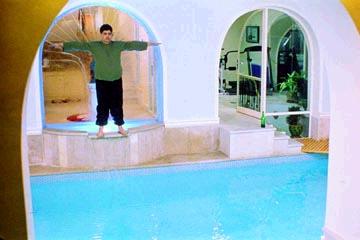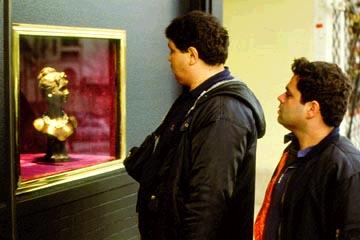Crimson Gold
(Talaye Sorkh)


Hussein (Hossain Emadeddin) is a guy pretty down on his luck. He's an ex-soldier who was somehow injured, and now delivers pizza. He has a hulking presence about him, and pretty taciturn. Jafar Panihi (The Circle, Ardekoul) uses Hussein to show the imbalance in Iranian society; how some people get ahead economically but others get left behind. It's a pretty moving tale, albeit a thin one. This divide is large enough to cause Hussein to hold up a jewelry store, as he does at the beginning of Crimson Gold. Panihi and screenwriter Abbas Kiarostami (The Deserted Station, Ten) then flash back to show the events leading up to Hussein's actions.
Like other films in Persian cinema, Panihi uses non-actors. This brings a sense of realism to the roles, since the viewer is watching ordinary people do ordinary things. The one drawback is that these people are not trained to come across as natural, so their delivery is sometimes clumsy. For Emadeddin, it is hard to tell what he is thinking, because Panihi gives him so few lines. He moves slowly and deliberately, and the only obvious emotion he shows is annoyance at the people around him. Hussein lives in a run down apartment, and the only time he glimpses the upper class is along his pizza delivery route. Each delivery brings a tantalizing glimpse into spacious, opulent apartments that he will never be able to afford.
He finds a receipt for an expensive necklace and goes to visit the jewelry store. The owner (Shahram Vaziri) doesn't even let him and his friend (Kamyar Sheisi) inside. He returns later, dressed in a suit looking for jewelry. After a quick conversation, the owner suggests he find some cheaper jewelry elsewhere. Although he looks relatively unfazed, it is clear that this bothers him. Hussein wants some sort of recognition from Vaziri. Recognition from one of these members of the upper class would be a sort of redemption for Hussein. It proves that he is somebody, that he exists.
Hussein later ends up in a magnificent apartment, where he can see close up just what he does not have. Is it fair that he fought for his country, only to return to toiling away for nothing, while a spoiled kid can get so much? The world is passing Hussein by, and the more he thinks about it the more it bothers him. Crimson Gold is also a nice look at a segment of Iranian society seldom glimpsed in film; the affluent, successful part. They shut their doors to their countrymen, creating an artificial divide between the classes. For Panihi, it's an interesting study. It doesn't quite go anywhere, but it is interesting nonetheless.